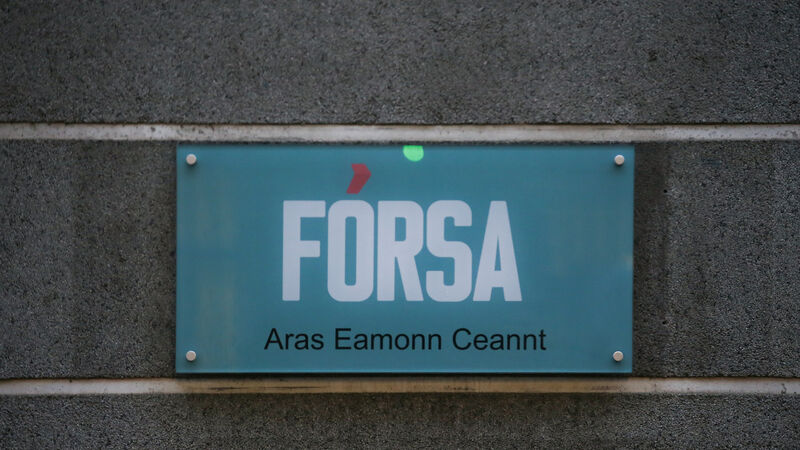Cork Fórsa union official: Industrial action 'necessary'

File Photo Fórsa to ballot pilot members at Ryanair on new collective agreement. End 20/01/2021 Covid-19 Pandemic (Coronavirus), Ireland. Day 301 since start of lockdown. Day 21 of return to Level 5 restrictions. The Minister for Education last night said that the planned return to in-school learning for children with special educational needs on Thursday 21 January will not be possible, after talks with Fórsa and the Irish National Teachers' Organisation (INTO) collapsed. Photograph: Sam Boal / RollingNews.ie
GOVERNMENT “foot-dragging” has made necessary industrial action which will affect hundreds of vulnerable service-users across Cork city and county, a union official has said.
Fórsa, which is Ireland’s largest public service trade union, has backed a proposal for indefinite strike action in a number of community and voluntary sector agencies funded by the HSE.
The action is likely to involve hundreds of health and care staff, in a number of agencies, with the union committing to paying the wage costs of striking staff.
The dispute centres on a long-running demand for improved terms and conditions of employment for health and social care professionals and other staff employed in agencies funded by the HSE and other State bodies, where staff are employed on lower pay and lesser conditions than equivalent grades in the HSE and other agencies.
So-called Section 39 organisations are contracted to provide services on behalf of the HSE for a funding grant in accordance with Section 39 of the Health Act 2004.
Section 39 agencies provide a range of residential and day services for people with disabilities, mental health, addiction, domestic and sexual violence services, and other supports, under service level agreements with the HSE. Similarly, Section 56 agencies operate in a comparable way for children’s services, funded by Tusla.
Until 2008, workers in these agencies received pay increases under national wage agreements.
At the onset of the financial crisis they were subject to FEMPI pay cuts in line with the same cuts applied to public sector pay. Limited pay restoration measures were eventually won by unions in 2019 but pay in these agencies remains significantly behind, and no formal mechanism for collective pay bargaining exists for workers in the sector.
Several one-day strikes were held at community, voluntary and healthcare organisations across the country last year as part of a campaign by Fórsa, SIPTU and the Irish Nurse and Midwives Organisation(INMO) demanding better pay and conditions.
Fórsa assistant general secretary Eddie Walsh, who is based in Cork’s Father Mathew Quay, told The Echo that thousands of vulnerable service users across the country will be affected by the action, but he said Government inaction had left workers with no choice.
“It is very important for people to realise that this is one of the most difficult sectors to get staff to take action because of the affinity they have for their work and for the service users, who are some of the most vulnerable people in society,” Mr Walsh said.
“If you saw the industrial action we took last year, we got resounding positive feedback from families that somebody is finally trying to take action to ensure that the services are going to be maintained and are actually going to be staffed.” Mr Walsh said Section 39 workers have not received a pay increase in 14 years, meaning that agencies are experiencing significant staff recruitment and retention issues, with up to a third of all staff leaving to take up positions which were often similar or identical within the HSE and Section 38 agencies but with vastly superior pay and conditions.
“To give you an example here in Cork county, we have three Section 39 agencies: Enable Ireland, St Joseph’s Foundation, and CoAction, and you would have two Section 38 agencies which are the Brothers of Charity, and the Cope Foundation, and Section 38 employees enjoy the same terms and conditions as HSE employees, with pay and pensions and other contractual arrangements,” Mr Walsh said.
“What we want is the same terms and conditions for our members employed by Section 39 agencies as those who are employed by Section 38 and HSE organisations.
“Everyone is on the same page here, employers included, there is no dispute between Fórsa and any individual employer, they are also lobbying Government quite hard to try and get improved terms and conditions aligned to the Section 38 agencies and the HSE to maintain the survival of their services,” he added.
The Government, the Department of Health and the HSE have not taken any meaningful action to address the issue, Mr Walsh said, and now it was felt that workers had no other option but to take industrial action.
The Department of Health has said that because so-called Section 39 and Section 56 organisations are privately owned, setting pay rates for their staff is not a matter for the Government.
A HSE spokesperson said that Section 39 staff are not direct employees of the HSE but, they said, the HSE has indicated its “willingness at being party at any third party process, such as Workplace Relations Commission (WRC) conciliation”.
“The resolution of these matters is not within the remit solely of the HSE,” the HSE spokesperson added.







 App?
App?


